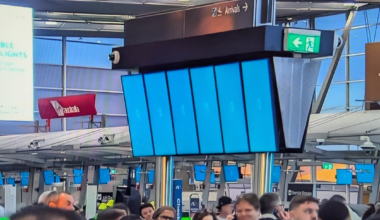US Immigration : Nonimmigrant Visa Waivers – Process & Criteria | All You Need To Know About Nonimmigrant Visa Waivers
Nonimmigrant visa waivers are issued to individuals who meet certain criteria, and have been approved by the United States Customs and Border Protection (CBP). Once an applicant has been issued with a visa waiver, he or she may stay in the U.S., without applying for an actual visa from the embassy or consulate, for up to 90 days. It’s important to note that visa waivers do not constitute full admission into the country; they are merely a way of bypassing lengthy visa application processes. Read on to find out more about nonimmigrant visa waivers and how you can obtain one of your own!
How do I apply for a nonimmigrant visa waiver?
The first step is to check if you’re eligible. You can do this by reading the criteria on the U.S. Department of State’s website. If you meet the requirements, the next step is to fill out an application. Once you’ve submitted your application, you will be contacted for an interview. During the interview, a consular officer will determine whether or not you are eligible for a waiver. If you are approved, you will be issued a waiver which allows you to enter the United States without a visa. It must be done in person at a port of entry in one of two ways: you can either show up at the airport with your passport and nonimmigrant visa waiver (in case you need to apply for one), or you can mail it to the address provided on the application form. If granted, what does it mean? A nonimmigrant visa waiver means that people from certain countries can visit the United States without first obtaining a B-1/B-2 visitor visa from an American embassy or consulate. Visas are waived for citizens from countries that have signed agreements with America and there is no risk of terrorists crossing into our country via these agreements.
What are my chances of being granted a nonimmigrant visa waiver?
The chances of being granted a nonimmigrant visa waiver are very good if you meet the following criteria: 1) You have a valid passport from a country that participates in the Visa Waiver Program. 2) You plan to stay in the United States for 90 days or less. 3) You have a round-trip ticket. 4) You have enough money to support yourself during your stay. 5) You do not have a criminal record. 6) You do not pose a security threat to the United States. 7) You have not been denied entry into the United States in the past. 8) You have a communicable disease, but it is controlled with medication. 9) Your case does not fall under any of the exceptions set forth by Congress.
The process is easy and quick; all you need to do is complete an online form and pay a fee before getting an approval decision within seconds! In many cases, it takes up to 15 minutes. Be sure to provide all the information requested on the form as accurately as possible because this will significantly increase your chances of being approved for the visa waiver program!
Do I need an attorney to apply for a nonimmigrant visa waiver?
No, you do not need an attorney to apply for a nonimmigrant visa waiver. The process is fairly simple and can be done entirely on your own. All that needs to be done is fill out the form DS-160 which will ask you questions about who you are and what your travel plans are. After filling out the form, upload it along with two passport photos and the fee of $131 in order to complete the application process. Once all these steps have been completed, your form will go through various security checks before being sent to the Department of Homeland Security. If you are approved by DHS, they will notify you by email and if they deny your request then they will send a letter telling you why and how to appeal their decision.
Am I guaranteed entry if I am approved?
While you may be approved for a waiver, this does not guarantee your entry into the United States. The waiver only authorizes you to travel to a U.S. port-of-entry (POE), where an immigration officer will make the final decision on whether or not to admit you into the country. Factors that may influence the officer’s decision include, but are not limited to, your reason for travel, ties to your home country, and whether or not you pose a security threat. In some cases, if you have been previously denied a visa, it is likely that you will also be denied admission with a nonimmigrant visa waiver. To avoid such an outcome, apply for a traditional visa instead of applying for a waiver at the last minute.
In general, border officials typically want to see evidence of compelling reasons why you should be granted entry into the United States in order to approve your application. There are many factors that can disqualify you from being granted admission with a waiver including, but not limited to: intent of study; intent of business; family connections in country; cultural or historical significance in country; prior overstays in the US; criminal history (such as drunk driving); and financial instability abroad. If any of these factors apply to you and would bar your eligibility for a traditional visa under ESTA rules, then they will most likely bar your eligibility for a nonimmigrant visa waiver as well.
How long will the process take?
The process of applying for a nonimmigrant visa waiver can take anywhere from a few days to a few weeks. The first step is to gather all of the required documentation. Next, you’ll need to submit an online application and pay the application fee. Once your application has been reviewed, you’ll be contacted for an interview. After the interview, you’ll receive a decision letter letting you know whether or not your visa has been approved. If it’s been denied, you may have the opportunity to request reconsideration with more information. However, if your denial remains unchanged after review, then you’ll need to apply for a traditional visa at the nearest consulate office in order to travel.
Will my family members be able to come with me?
If you are planning on applying for a nonimmigrant visa waiver, there are a few things you should keep in mind. First, make sure you meet all the eligibility requirements. Second, fill out the application completely and accurately. Third, submit all required documentation. Fourth, pay the application fee. Fifth, schedule an interview with a consular officer. Sixth, attend your interview and be prepared to answer questions about your trip. Finally, if your application is approved, you will be issued a visa. The visa is valid for two years or until the expiration date listed on it, whichever comes first. It can also be used to enter any other country while you’re waiting for your U.S. immigrant visa interview appointment at a U.S. embassy or consulate abroad, as long as that country grants visas on arrival without prior approval from their immigration authorities.
Is there anything else I should know about applying for a nonimmigrant visa waiver?
Applying for a nonimmigrant visa waiver is a big decision with a lot of paperwork. The first step is to fill out the I-601A form, which you can find on the U.S. Citizenship and Immigration Services (USCIS) website. Be sure to complete the form accurately and completely, as any mistakes could delay your application. Once you’ve submitted the form, you’ll need to wait for a decision from USCIS. If your application is approved, you’ll be able to move forward with applying for a visa. You may also apply for an ESTA, or electronic system for travel authorization. You will then have to go in person to the embassy or consulate that serves your country of citizenship to get a tourist visa before traveling to the United States. Keep in mind that this procedure does not guarantee entry into the US, so if your application is denied, you will not be allowed to board a plane. In order to avoid these problems, it’s best to file for an immigrant visa instead of submitting an I-601A form unless absolutely necessary.




